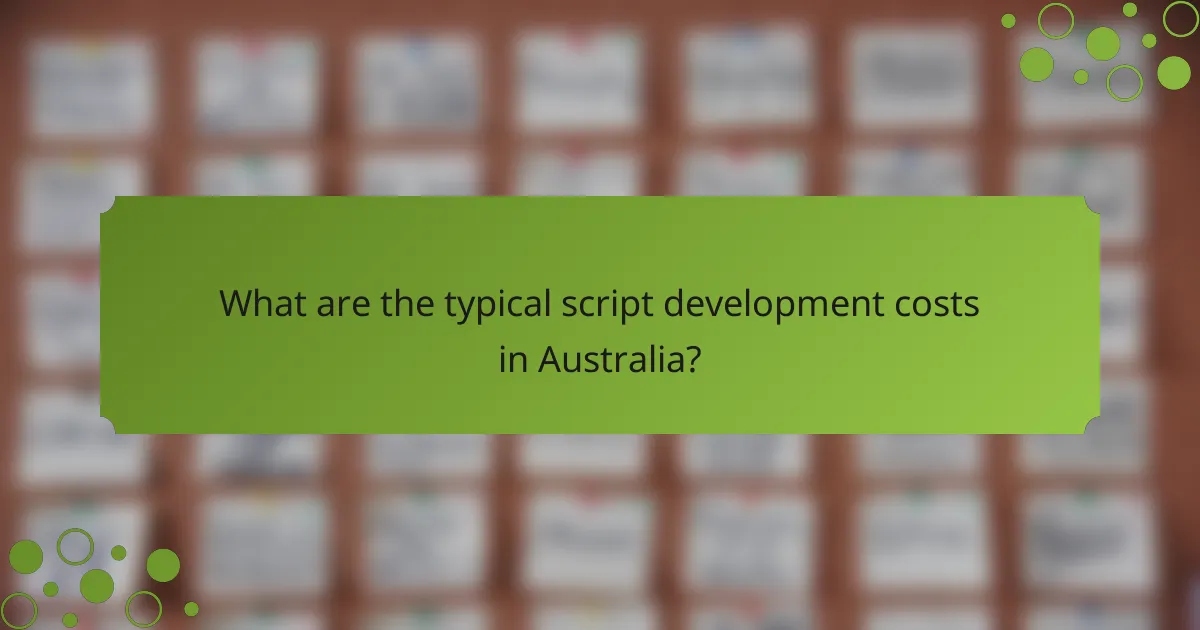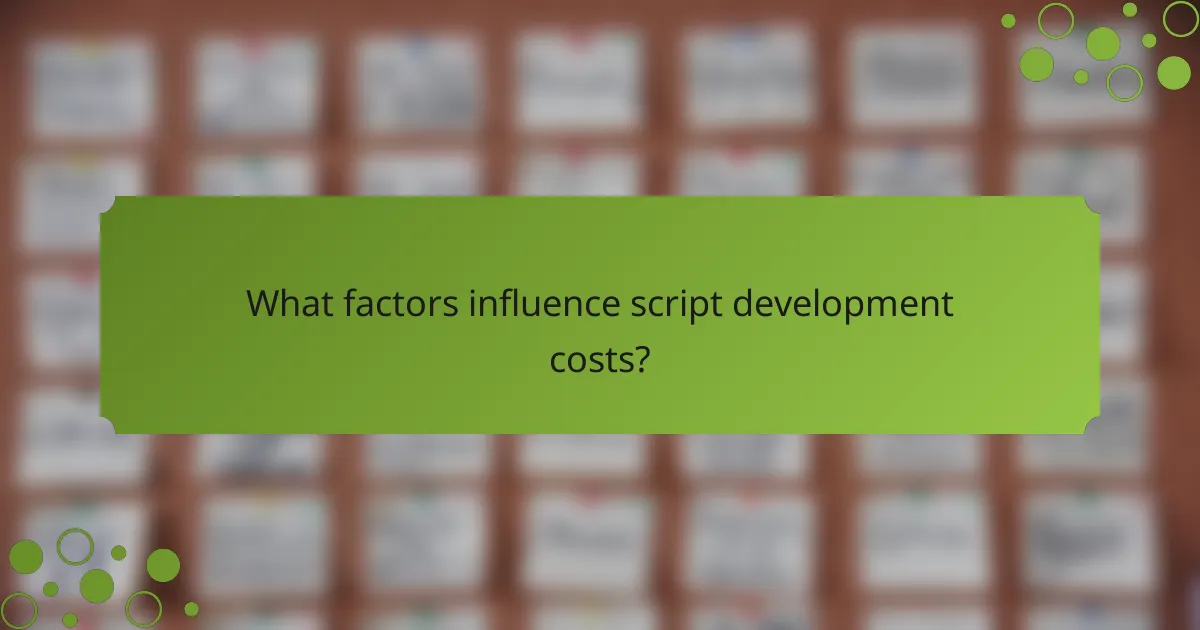Script development costs can vary widely depending on factors such as the writer’s experience, the complexity of the project, and the specific genre being pursued. Key expenses include writer fees, research costs, and potential revisions, all of which contribute to the overall investment in creating a compelling script. Proper budgeting is essential to ensure financial viability while allowing for necessary creative adjustments throughout the development process.

What are the typical script development costs in Australia?
Script development costs in Australia can vary significantly based on the project’s scope and the writer’s experience. Generally, these costs encompass writer fees, research expenses, and revision costs, which together form the total investment in developing a script.
Average writer fees in Australia
Writer fees in Australia typically range from AUD 1,000 to AUD 5,000 for a feature-length script, depending on the writer’s experience and reputation. Emerging writers may charge lower fees, while established professionals can command higher rates.
It’s common for writers to negotiate fees based on the project’s budget and their level of involvement. Some may also work on a per-page or per-hour basis, which can influence the overall cost.
Common research expenses
Research expenses for script development can vary widely, often falling between AUD 500 and AUD 2,000. These costs may include purchasing books, accessing databases, or hiring experts for consultations to ensure accuracy and depth in the script’s subject matter.
Writers should budget for research as it can significantly enhance the script’s authenticity and appeal. Allocating sufficient resources for thorough research can prevent costly revisions later on.
Typical revision costs
Revision costs can add another AUD 500 to AUD 3,000 to the overall script development budget. These costs arise from the need to refine the script based on feedback from producers, directors, or test audiences.
It’s advisable to plan for multiple rounds of revisions, as scripts often evolve through collaborative processes. Clear communication about the number of revisions included in the initial fee can help manage expectations and costs effectively.

How to budget for script development?
Budgeting for script development involves estimating costs associated with writer fees, research expenses, and revisions. A well-structured budget helps ensure that the project remains financially viable while allowing for necessary creative adjustments.
Creating a detailed budget plan
Start by outlining all potential expenses related to script development. This includes writer fees, which can vary widely based on experience, typically ranging from hundreds to thousands of dollars per script. Allocate funds for research, as thorough background work can significantly enhance the script’s quality.
Consider breaking down the budget into categories such as pre-production, production, and post-production costs. This approach allows for better tracking of expenses and helps identify areas where adjustments might be needed. A sample budget might include:
- Writer fees: $1,000 – $10,000
- Research expenses: $200 – $2,000
- Revisions: $500 – $5,000
Identifying hidden costs
Hidden costs can significantly impact the overall budget for script development. These may include expenses for additional revisions beyond the initial agreement, which can add up quickly. It’s essential to clarify the number of revisions included in the writer’s fee to avoid unexpected charges.
Other hidden costs might involve hiring specialists for specific research areas or purchasing materials necessary for accurate storytelling. Always factor in potential costs for legal consultations if the script involves sensitive topics or copyrighted material. Being aware of these factors can help prevent budget overruns and ensure a smoother development process.

What factors influence script development costs?
Script development costs are influenced by several key factors, including the experience level of the writer, the length and complexity of the script, and the market demand for specific genres. Understanding these elements can help budget effectively for scriptwriting projects.
Experience level of the writer
The experience level of a writer significantly impacts script development costs. Established writers with a proven track record typically command higher fees, often ranging from hundreds to thousands of dollars per script, depending on their reputation and previous work.
In contrast, emerging writers may charge lower fees, potentially in the low hundreds. However, hiring less experienced writers can involve risks, such as needing more revisions or less polished scripts.
Length and complexity of the script
The length and complexity of a script are crucial in determining development costs. A standard feature-length script usually falls between 90 to 120 pages, and longer or more intricate scripts may require additional writing time and research.
For example, a simple, straightforward script may cost less to develop, while a complex narrative with multiple characters and subplots could increase fees significantly. Writers may charge extra for extensive research or specialized content, so it’s essential to clarify these expectations upfront.
Market demand for specific genres
Market demand for specific genres can greatly influence script development costs. Genres that are currently trending, such as thrillers or romantic comedies, may attract higher fees due to increased interest from producers and studios.
Conversely, niche genres may have lower demand, resulting in reduced budgets for scripts. Writers should consider current market trends and audience preferences when setting their fees, as aligning with popular genres can lead to more lucrative opportunities.

How to choose a scriptwriter in Australia?
Choosing a scriptwriter in Australia involves assessing their portfolio, experience, and specialization to ensure they align with your project’s needs. Focus on their previous work quality and relevance to your genre or style.
Evaluating writer portfolios
When evaluating writer portfolios, look for samples that demonstrate versatility and creativity. Check if their previous scripts have been produced or if they have notable achievements, such as awards or recognitions.
Consider the genres they have worked in and whether their style matches your vision. A strong portfolio should showcase a range of writing skills, including dialogue, character development, and plot structure.
Considering writer experience and specialization
Experience can significantly impact a scriptwriter’s effectiveness. Writers with several years in the industry often have a deeper understanding of narrative techniques and audience engagement.
Specialization is equally important; some writers excel in specific genres like drama, comedy, or horror. Identify your project’s needs and seek writers who have a proven track record in that area to enhance the likelihood of success.

What are the common pricing models for scriptwriting?
Common pricing models for scriptwriting include hourly rates and flat fees for complete scripts. Each model has its own advantages and considerations, depending on the project scope and writer’s experience.
Hourly rates for scriptwriters
Hourly rates for scriptwriters can vary significantly based on experience, location, and project complexity. Typically, rates may range from $25 to $150 per hour, with established writers often commanding higher fees.
When hiring a scriptwriter at an hourly rate, it’s essential to establish clear expectations regarding the number of hours anticipated for the project. This helps avoid budget overruns and ensures that both parties are aligned on the timeline and deliverables.
Flat fees for complete scripts
Flat fees for complete scripts provide a clear, upfront cost for the entire project, which can be beneficial for budgeting. These fees can range from a few hundred to several thousand dollars, depending on the script’s length and complexity.
When negotiating a flat fee, consider the writer’s experience and the expected revisions. It’s wise to include terms for additional revisions or changes to avoid unexpected costs later in the process.

What are the best practices for managing script revisions?
Effective management of script revisions involves establishing clear guidelines and maintaining open communication with writers. This ensures that revisions are executed smoothly and meet the project’s objectives without unnecessary delays.
Establishing a clear revision policy
A well-defined revision policy outlines the number of revisions allowed, timelines for feedback, and specific criteria for what constitutes a successful revision. For example, you might set a limit of two major revisions and specify that feedback should be provided within a week of submission.
Consider creating a checklist that includes essential elements such as plot consistency, character development, and dialogue quality. This helps writers focus on key areas during revisions and reduces the likelihood of repeated changes.
Communicating effectively with writers
Clear and constructive communication is vital for successful script revisions. Provide detailed feedback that highlights strengths and areas for improvement, avoiding vague comments that can lead to confusion. Use specific examples from the script to illustrate your points.
Regular check-ins can also enhance communication. Schedule brief meetings or calls to discuss revisions and address any questions writers may have. This fosters a collaborative environment and helps keep the project on track.

How can online courses help in understanding script development costs?
Online courses can provide valuable insights into script development costs by covering essential topics such as budgeting, writer fees, and the revision process. These courses often include practical examples and case studies that help aspiring writers grasp the financial aspects of scriptwriting.
Courses on budgeting for scriptwriting
Courses focused on budgeting for scriptwriting teach writers how to allocate funds effectively throughout the development process. Participants learn to estimate costs related to research, writer fees, and production expenses, which can vary widely depending on the project’s scope.
For instance, a typical budget for a short film script might range from a few hundred to several thousand dollars, depending on factors like location and talent involved. Understanding these financial elements can help writers make informed decisions and avoid overspending.
Workshops on negotiating writer fees
Workshops that concentrate on negotiating writer fees equip writers with the skills to discuss compensation confidently. These sessions often cover industry standards for fees, which can fluctuate based on experience, project type, and market demand.
For example, a novice screenwriter might expect to earn between $1,000 to $5,000 for a script, while seasoned professionals can command much higher rates. Learning negotiation techniques can empower writers to advocate for fair compensation and ensure their work is valued appropriately.

What emerging trends affect script development costs?
Emerging trends in script development significantly impact costs, primarily through evolving industry standards, technology advancements, and changing audience preferences. Understanding these trends helps writers and producers budget effectively and allocate resources wisely.
Writer fees
Writer fees are influenced by factors such as experience, project scope, and market demand. Established writers may command higher rates, often ranging from hundreds to thousands of dollars per script, while new writers might charge less as they build their portfolios. It’s essential to assess the project’s complexity and the writer’s expertise when determining appropriate compensation.
Additionally, the rise of streaming platforms has created a competitive landscape, leading to increased demand for quality scripts. This demand can drive up fees, especially for writers who can deliver content that resonates with modern audiences.
Research expenses
Research expenses can vary widely based on the script’s subject matter and required depth of knowledge. For instance, scripts that involve specialized topics, such as historical events or scientific concepts, may necessitate extensive research, leading to costs in the low hundreds to thousands of dollars. Writers should budget for research time and resources to ensure accuracy and authenticity.
Utilizing online databases, libraries, and expert consultations can help manage research costs effectively. Writers should prioritize sources that provide reliable information while being mindful of their budget constraints.
Revisions
Revisions are a critical part of the script development process and can significantly affect overall costs. Typically, multiple rounds of revisions are expected, which may incur additional fees based on the writer’s agreement. It’s common for writers to charge a flat fee for a set number of revisions or an hourly rate for extensive changes.
To minimize revision costs, clear communication between writers and producers is essential. Establishing a detailed outline and feedback process upfront can help streamline revisions and reduce the likelihood of costly changes later in the development process.



